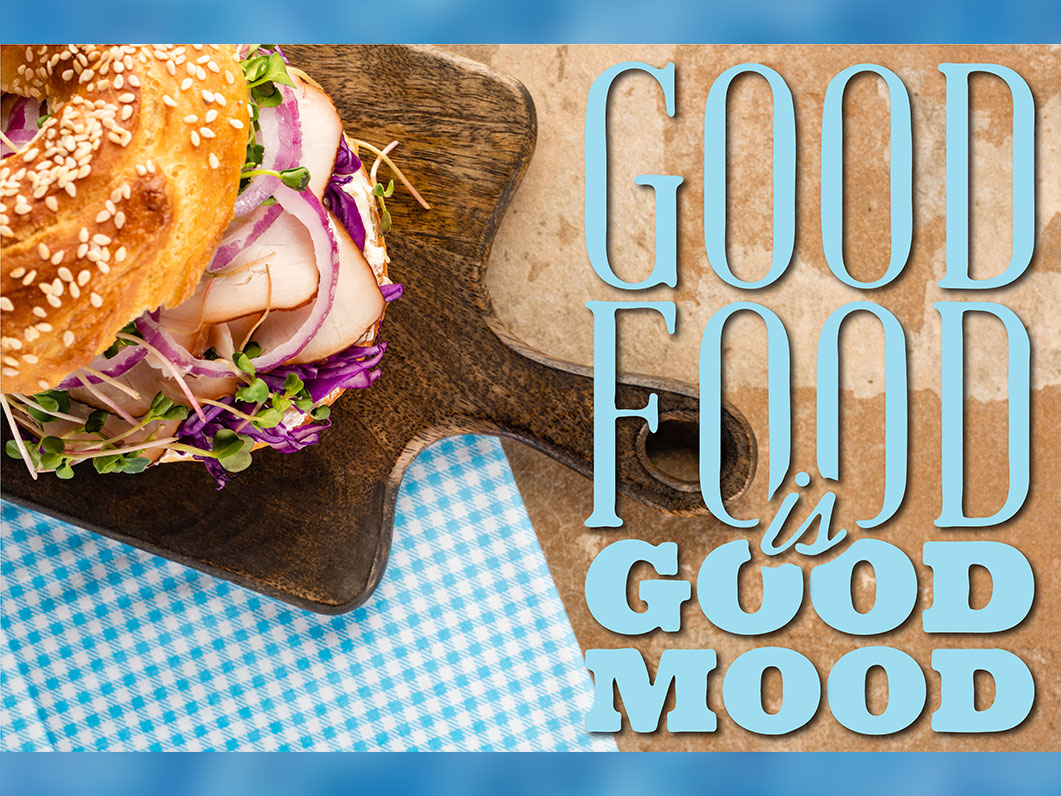Can we get an amen? From the good folks at Produce for Better Health Foundation comes a story of very good news this week, and that is scientists say eating fresh fruits and vegetables can boost one’s mood.
The story is posted at https://fruitsandveggies.org/stories/what-behavioral-science-has-to-say-about-food-mood/, and author Jason Riis, Chief Behavioral Scientist for PBH. His bio is impressive: He “has published and consulted widely on problems related to behavior change, belief change and thinking process. He has collaborated with leading academics in the fields of psychology, economics, marketing and health policy. He has been a full time faculty member for 10 years at Harvard Business School and The Wharton School (University of Pennsylvania). His consulting work has helped Fortune 500 companies, startups and non-profits develop and test initiatives inspired by behavioral science. He is passionate about change related to health, wellness and technology.”
And he says research has shown “associations between healthy eating and well-being.” Depression has been associated with obesity, and in a happy opposite, “more positively, healthy eating, including the consumption of fruits and vegetables is associated with higher levels of general happiness.”
Riis says it’s “useful to understand the relationships between fruits and vegetables and happiness (or mood) from two vantage points: how fruit and vegetable consumption might lead to better mood, and how better mood might lead to fruit and vegetable consumption.”
How does it work? “Fruits and vegetables are associated with better health outcomes. Better health outcomes can be associated with happiness. Therefore, fruit and vegetable consumption has at least an indirect effect on happiness (through improved health).”
There’s also a more direct cause/effect in play, “most obviously through enjoyment of the taste, but also through the shared experience of eating foods widely known to be healthy,” he writes.
“Eating foods we know to be healthy can lead to a positive emotions like pride. It can also support feelings of increased self-esteem, especially if the fruit and vegetable consumption can replace some ‘guilty’ food experiences. This is, of course, more powerful if the fruit and vegetable consumption is part of a habit or routine and really becomes part of one’s identity.”
Riis cites psychologists Mike Norton and Liz Dunn, who he notes argue that happiness is “more readily built through social experience than through material reward. Many social experiences can be built through fruit and vegetable consumption. For example, preparing healthy foods for loved ones can be deeply satisfying. Sharing foods that have rich historical and cultural traditions can reinforce the experience of familial and social affiliation.”
Riis continues, “Sharing fruit and vegetable experiences can also lead to positive mood through public recognition. Receiving ‘likes’ or praise on healthy-consumption-based social media posts can be a source of pride and joy.” He gives two examples: “Kids helping parents cook with fruits and veggies. #VeggieChef” and “Family dinner, featuring veggies first. #VeggiesFirst #VeggieAppetizer.”
There’s also the continuum — being in a better mood as the result of eating health-giving fruits and vegetables can lead to increased consumption of fruits and vegetables.
Take note, marketers. “Many aspects of mood can influence consumption choices,” Riis writes. “This has implications for how consumers, caregivers, influencers, and marketers should think about the timing of their efforts. We should ask questions like ‘when will people be in the mood for fruits and vegetables?’ While there are few studies directly focused on that question, we can make some suggestions based on a broader set of research.”
People oftentimes set self-improvement, i.e., dietary, goals on Jan. 1 or on birthdays. “The motivational boost at these times seems to originate from a tendency to think about our best selves, rather than our past selves,” Riis says. “This isn’t necessarily a ‘happy’ mood, but it does seem there is a feeling of inspiration and optimism that makes people a little more motivated to reach their goals. Since most people believe they should eat more fruits and vegetables, these fresh start moments may be opportunities to kickstart new consumption behaviors and habits.”
Habits form over time as the result of repetition. Reinforcing with a reward, either to oneself or to another person being supported, is a good plan, and Riis says, “So, celebrate when kids eat fruits and vegetables! Celebrate loud and celebrate often! The rewards of pride and happiness this can instill in children will make them more likely to repeat the desired behavior next time.”
The reinforcement helps build positive moods, which foster perseverance. Win/win.
What about so-called comfort foods? Mac and cheese, ice cream. Chocolate. (Editor’s note: We’re talking over-indulgence here, not abstinence. Especially with chocolate…)
Riis says, “Positive moods are also associated with higher levels of impulse control. We’ve all heard the term ‘comfort food,’ and it rarely refers to healthy snacks. A good mood can eliminate our need for ‘comfort food’ and thus help us resist our impulse to choose indulgent, high-calorie comfort food, and select healthier fruits and vegetables instead.”
His conclusion is common sense, reassuring and motivating.
“Fruits and vegetables can lift our mood,” Jason Riis says. “And an elevated mood can lead to more fruit and vegetable consumption. Messaging and marketing strategies aimed at positively impacting fruit and vegetable consumption may, thus, benefit from positive emotional associations and images. Specifically, efforts to cultivate increased fruit and vegetable consumption among children should be infused with positivity, celebration of success, and encouragement. Pride in fruit and vegetable consumption can be nurtured among children and adults alike. Fruits and veggies really are Foods Rooted In A Better Mood®.”


